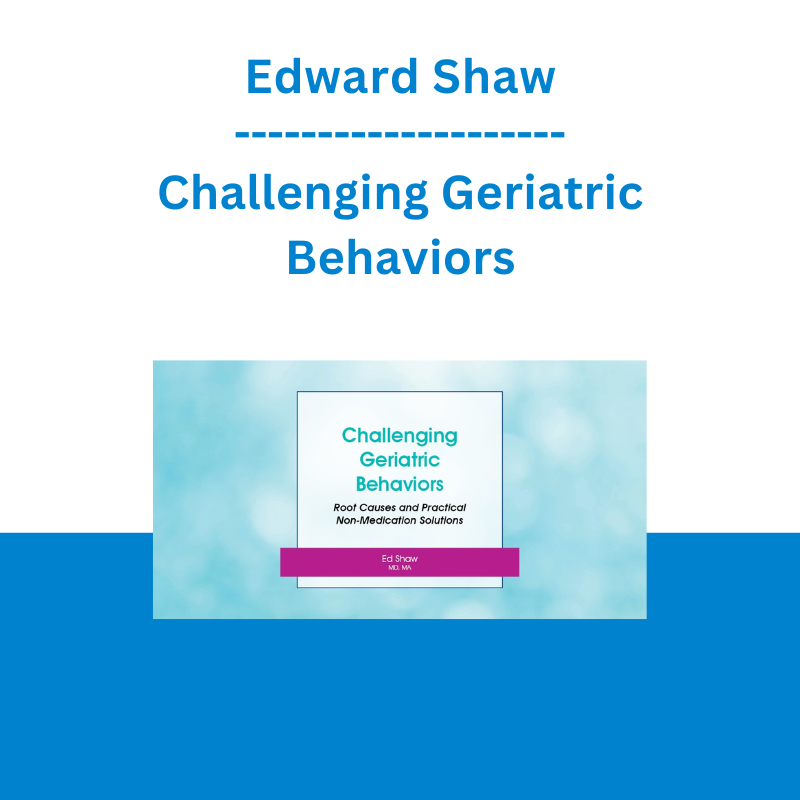*** Proof of Product ***
Exploring the Essential Features of “Edward Shaw – Challenging Geriatric Behaviors: Root Causes and Practical Non-Medication Solutions”
Speaker: Edward G. Shaw, MD, MA
Duration: 1 Hour 55 Minutes
Format: Audio and Video
Copyright: Oct 26, 2021
Media Type: Digital Seminar
Description
Behavior challenges are some of the most difficult problems family care partners and professional caregivers face when caring for an aging loved one or a person living with dementia. You will learn about the root causes of behavior challenges, a framework to assess, prevent, and manage behaviors, and a number of other non-medication-based strategies that really work!
Speaker
Edward G. Shaw, MD, MA
Empath Education, LLC
Edward G. Shaw, MD, MA is dually trained as a physician and mental health counselor. He was the primary care partner for his late wife, Rebecca, who was diagnosed with early-onset Alzheimer’s disease in 2007 at age 53 and died in 2016 after a 9-year journey. Ed was a practicing academic radiation oncologist for 23 years, specializing in the treatment of adults and children with brain cancer. In 2010, inspired by Rebecca’s journey, his medical interest shifted to dementia diagnosis and treatment, and with his addition training in mental health counseling, he founded the Memory Counseling Program in 2011, part of the Section on Gerontology and Geriatric Medicine and the Sticht Center on Healthy Aging and Alzheimer’s Prevention at Atrium Health Wake Forest Baptist in Winston-Salem, North Carolina. The program serves individuals, couples, and families affected by Alzheimer’s disease or another type of dementia.
He is the author of four books. Along with coauthors Deborah Barr and Dr. Gary Chapman, he wrote Keeping Love Alive as Memories Fade: The 5 Love Languages and the Alzheimer’s Journey, which describes his moving personal story of care for Rebecca coupled with an innovative use of the 5 love languages in dementia counseling. He also wrote The Dementia Care Partner’s Workbook, a support group manual and self-study guide for dementia care partners, providing understanding, education, and hope for the long journey of dementia caregiving from diagnosis through end-of-life. He has also co-authored two resources for support group leaders, A Leader’s Manual for Dementia Care Partner Support Groups and A Support Group for People Living with Dementia: The Leaders Manual.
Speaker Disclosures:
Financial: Edward Shaw receives a speaking honorarium and recording royalties from PESI, Inc. He has no relevant financial relationships with ineligible organizations.
Non-financial: Edward Shaw has no relevant non-financial relationships.
Objectives
- Apply the three-component framework of geriatric and dementia-related behaviors to understand, prevent, and manage situations that occur in your practice setting.
- Differentiate between those behavior changes seen with normal aging and early-stage dementia to those typical of moderate- to late-stage dementia.
- Analyze the principles of attachment loss and separation distress to manage the most challenging geriatric behaviors safely, effectively, confidently, and compassionately.
Outline
Key Approaches to Geriatric/Dementia-Related Behaviors
- Medical/mental health issues with the person
- Caregiver challenges
- Environmental causes
- Applying a new framework to clinical practice
Solve Common Challenging Geriatric Behavioral Expressions
- Secure and insecure attachment
- Separation distress
- Seeking and withdrawn responses
Challenging Behaviors with Aging and Dementia
- Apathy
- Lack of insight/denial
- Impaired judgment
- Repetitive and persistent behaviors
- Lost identity
- Delusions and hallucinations
- Behavioral disinhibition
- Obsessive/compulsive behaviors and hoarding
- Agitation and aggression
- Wandering
- Sexual behaviors
- Resisting care
- Sundowning
- Refusing to eat and other nutrition issues
- Insomnia, day/night reversal, and other sleep issues
- Acknowledge/affirm/redirect
- Keep it short/simple/safe
- Reminiscence approaches
- Mindfulness
Target Audience
- Nurses
- Nurse Practitioners
- Clinical Nurse Specialists
- Physician Assistants
- Physicians
- Physical Therapists
- Physical Therapist Assistants
- Occupational Therapists
- Occupational Therapy Assistants
- Speech Language Pathologists
- Social Workers
- Nursing Home Administrators
Please see the full list of alternative group-buy courses available here: https://lunacourse.com/shop/










 Ed Ponsi - Forex Trading
Ed Ponsi - Forex Trading  T. Harv Eker - Get Rich Doing What You Love
T. Harv Eker - Get Rich Doing What You Love  Simpler Trading - Bruce Marshall - The Options Defense Course
Simpler Trading - Bruce Marshall - The Options Defense Course  Dave Landry - Stock Selection Course
Dave Landry - Stock Selection Course